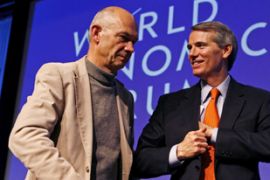‘Doha’ tops the agenda in Davos
Time is running out as trade ministers resume the Doha round of talks in Davos.

Pressure on
“The first danger would be not to succeed in the present round of trade negotiations,” Trichet said in a debate on global economic prospects.
The fate of the Doha round, suspended last July, has been one of the main talking points at the four-day annual gathering of business and political leaders in the Swiss ski resort.
Luiz Inacio Lula da Silva, the Brazilian president, said: “We have never been so close to doing a deal like this.”
He urged others, particularly the US and EU, not to lose the chance of a deal that could help ease poverty in many countries and inject hundreds of billions of dollars into the global economy.
 |
| Da Silva is determined to reach a conclusion to the Doha round [EPA] |
“If we wish to send a signal to the poorest countries on the planet that they will have an opportunity in the 21st century … these countries [US and EU countries] should assume responsibility for developing a pact so we can reach agreement in the Doha round,” he said.
Business groups from around the world have called on their governments to strike a deal.
Doha failures
The WTO’s Doha round of negotiations began in November 2001.
But the talks were suspended by the WTO director-general last July after five years of acrimonious meetings pitting the EU, the US and developing countries against each other.
Differences over how much the US should cut farm subsidies and how much the EU should reduce farm import tariffs halted the talks.
|
“I think everybody is prepared to make concessions now” Tony Blair, UK prime minister |
The EU and US both want big developing countries such as Brazil and India to open up their economies to industrial goods and services.
But developing countries, which are often left little choice but to engage in bilateral negotiations with larger blocs and countries, are nervous.
Mandisi Mpahlwa, the South African trade minister, said: “We are very concerned.
“We never had a round with so much on the table and the likelihood of losing it all is quite big.”
EU and US officials have been working on scenarios for how Washington can cut subsidies and how much Brussels can open up its markets in sensitive farm goods such as beef and dairy.
George Bush, the US president, faces a strong domestic agriculture lobby, while Peter Mandelson, the EU trade commissioner, has been repeatedly warned by France not to offer more farm concessions to get a deal.
Tony Blair, the British prime minister, noted that the atmosphere surrounding the talks had improved.
“I think everybody is prepared to make concessions now,” he said.